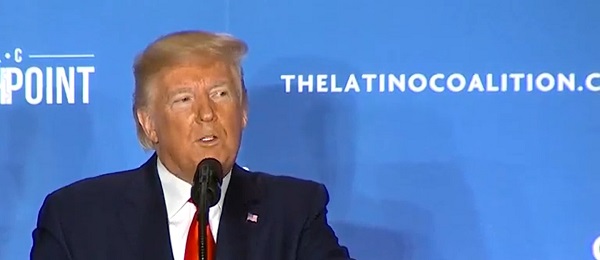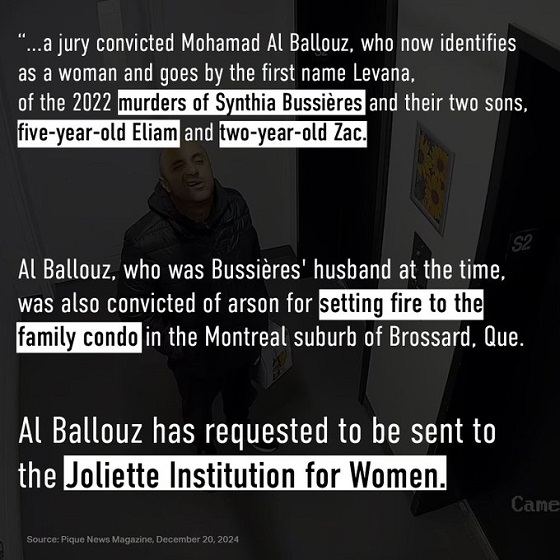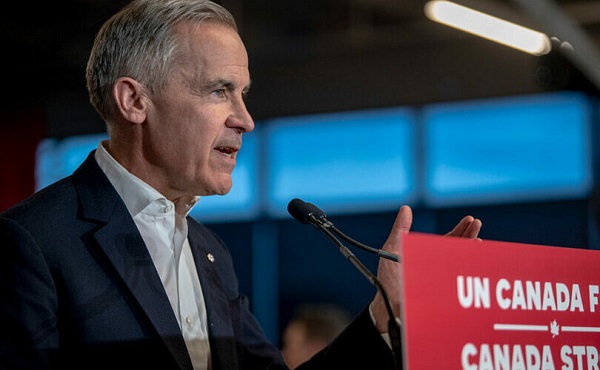Business
Canada Scrambles To Secure Border After Trump Threatens Massive Tariff


From the Daily Caller News Foundation
By Jason Hopkins
The Canadian government made clear its beefing up its border security apparatus after President-elect Donald Trump threatened to impose sweeping tariffs against Canada and Mexico if the flow of illegal immigration and drugs are not reined in.
Trump in November announced on social media that he would impose a 25% tariff on all products from Canada and Mexico unless both countries do more to limit the level of illicit drugs and illegal immigration entering into the United States. In response, Canada Prime Minister Justin Trudeau met with the president-elect at his residence in Mar-a-Largo and his government has detailed what more it’s doing to bolster immigration enforcement.
“We got, I think, a mutual understanding of what they’re concerned about in terms of border security,” Minister of Public Safety Dominic LeBlanc, who accompanied Trudeau at Mar-a-Largo, said of the meeting in an interview with Canadian media. “All of their concerns are shared by Canadians and by the government of Canada.”
“We talked about the security posture currently at the border that we believe to be effective, and we also discussed additional measures and visible measures that we’re going to put in place over the coming weeks,” LeBlanc continued. “And we also established, Rosemary, a personal series of rapport that I think will continue to allow us to make that case.”
Trudeau’s Liberal Party-led government has pivoted on border enforcement since its first days in power.
The Royal Canadian Mounted Police (RCMP) — the country’s law enforcement arm that patrols the border — is preparing to beef up its immigration enforcement capabilities by hiring more staff, adding more vehicles and creating more processing facilities, in the chance that there is an immigration surge sparked by Trump’s presidential election victory. The moves are a change in direction from Trudeau’s public declaration in January 2017 that Canada was a “welcoming” country and that “diversity is our strength” just days after Trump was sworn into office the first time.
While encounters along the U.S.-Canada border remain a fraction of what’s experienced at the southern border, activity has risen in recent months. Border Patrol agents made nearly 24,000 apprehensions along the northern border in fiscal year 2024 — marking a roughly 140% rise in apprehensions made the previous fiscal year, according to the latest data from Customs and Border Protection.
“While a change to U.S. border policy could result in an increase in migrants traveling north toward the Canada-U.S. border and between ports of entry, the RCMP now has valuable tools and insights to address this movement that were not previously in place,” read an RCMP statement provided to the Daily Caller News Foundation. “New mechanisms have been established which enable the RCMP to effectively manage apprehensions of irregular migrants between the ports.”
Trudeau’s pivot on illegal immigration enforcement follows the Canadian population growing more hawkish on the issue, public opinion surveys have indicated. Other polls also indicate Trudeau’s Liberal Party will face a beating at the voting booth in October 2025 against the Conservative Party, led by Member of Parliament Pierre Poilievre.
Trudeau’s recent overtures largely differ from Mexican President Claudia Sheinbaum, who has indicated she is not willing to bend the knee to Trump’s tariff threats. The Mexican leader in November said “there will be a response in kind” to any tariff levied on Mexican goods going into the U.S., and she appeared to deny the president-elect’s claims that she agreed to do more to beef up border security in a recent phone call.
Trump, who has vowed to embark on an incredibly hawkish immigration agenda once he re-enters office, has tapped a number of hardliners to lead his efforts. The president-elect announced South Dakota Gov. Kristi Noem to lead the Department of Homeland Security, former acting Immigration and Customs Enforcement Director Tom Homan to serve as border czar and longtime aide Stephen Miller to serve as deputy chief of staff for policy.
Business
Musk Slashes DOGE Savings Forecast By 85%


From the Daily Caller News Foundation
By Thomas English
Elon Musk announced Thursday that the Department of Government Efficiency (DOGE) is now targeting $150 billion in federal savings for fiscal year 2026 — dramatically scaling back earlier claims of slashing as much as $2 trillion.
Musk initially projected DOGE would deliver $2 trillion in savings by targeting government waste, fraud and abuse. That figure was halved to $1 trillion earlier this year, but Musk walked it back again at Thursday’s Cabinet meeting, saying the revised $150 billion projection will “result in better services for the American people” and ensure federal spending “in a way that is sensible and fair and good.”
“I’m excited to announce we anticipate saving in FY ’26 from a reduction of waste and fraud a reduction of $150 billion dollars,” Musk said. “And some of it is just absurd, like, people getting unemployment insurance who haven’t been born yet. I mean, I think anyone can appreciate — I mean, come on, that’s just crazy.”
The announcement marks the latest in a string of revised projections from Musk, who has become the face of President Donald Trump’s aggressive federal efficiency agenda.
“Your people are fantastic,” the president responded. “In fact, hopefully they’ll stay around for the long haul. We’d like to keep as many as we can. They’re great — smart, sharp, finding things that nobody would have thought of.”
Musk originally floated the $2 trillion figure during campaign appearances last fall.
“I think we could do at least $2 trillion,” Musk said at the Madison Square Garden campaign rally in November. “At the end of the day, you’re being taxed — all government spending is taxation … Your money is being wasted, and the Department of Government Efficiency is going to fix that.”
By January, he softened expectations to a “really quite achievable” $1 trillion target before downsizing that figure again this week.
“Our goal is to reduce the deficit by a trillion dollars,” Musk told Fox News’ Bret Baier “Looked at in total federal spending, to drop the federal spending from $7 trillion to $6 trillion by eliminating waste, fraud and abuse … Which seems really quite achievable.”
DOGE’s website, which tracks cost-saving initiatives and contract cancellations, currently calculates total federal savings at $150 billion.
2025 Federal Election
Taxpayers urge federal party leaders to drop home sale reporting to CRA

Party leaders must clarify position on home equity tax
The Canadian Taxpayers Federation is calling on all party leaders to prove they’re against home equity taxes by pledging to immediately remove the Canada Revenue Agency reporting requirement on the sale of primary residences.
“Canadians rely on the sale of their homes to pay for their golden years,” said Carson Binda, CTF B.C. Director. “After the government spent hundreds of thousands of dollars flirting with home taxes, taxpayers need party leaders to prove they won’t tax our homes by removing the CRA reporting requirement.”
Right now, the profit you make from selling your home is exempt from the capital gains tax. However, in 2016, the federal government mandated that Canadians report the sale of their homes to the CRA, even though it’s tax exempt.
The Canada Mortgage and Housing Corporation also spent at least $450,000 to study and influence public opinion in favour of home equity taxes. The report recommended a home equity tax targeting the “housing wealth windfalls gained by many homeowners while they sleep and watch TV.”
“A home equity tax would hurt seniors saving for their golden years and make homes more expensive for younger generations,” Binda said. “If the federal government isn’t planning on imposing a home equity tax, then Canadians shouldn’t be forced to report the sale of their home to the CRA.”
-

 2025 Federal Election2 days ago
2025 Federal Election2 days agoResearchers Link China’s Intelligence and Elite Influence Arms to B.C. Government, Liberal Party, and Trudeau-Appointed Senator
-

 Business1 day ago
Business1 day agoCanadian Police Raid Sophisticated Vancouver Fentanyl Labs, But Insist Millions of Pills Not Destined for U.S.
-

 2025 Federal Election2 days ago
2025 Federal Election2 days agoPoilievre Announces Plan To Cut Taxes By $100,000 Per Home
-

 2025 Federal Election2 days ago
2025 Federal Election2 days agoTwo Canadian police unions endorse Pierre Poilievre for PM
-

 2025 Federal Election21 hours ago
2025 Federal Election21 hours ago‘Sadistic’ Canadian murderer claiming to be woman denied transfer to female prison
-

 2025 Federal Election17 hours ago
2025 Federal Election17 hours agoTaxpayers urge federal party leaders to drop home sale reporting to CRA
-

 2025 Federal Election2 days ago
2025 Federal Election2 days agoCarney needs to cancel gun ban and buyback
-

 2025 Federal Election2 days ago
2025 Federal Election2 days agoMark Carney vows to provide sterilizing puberty blockers to children ‘without exception’







